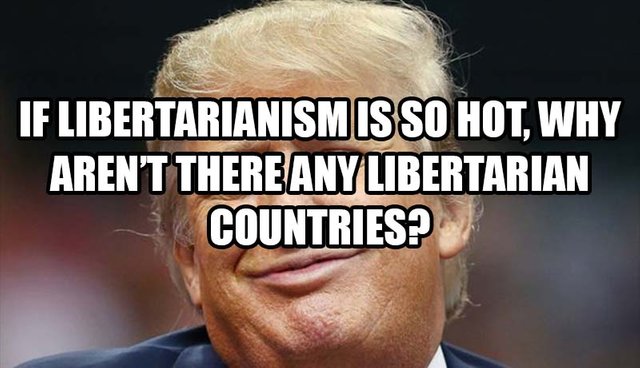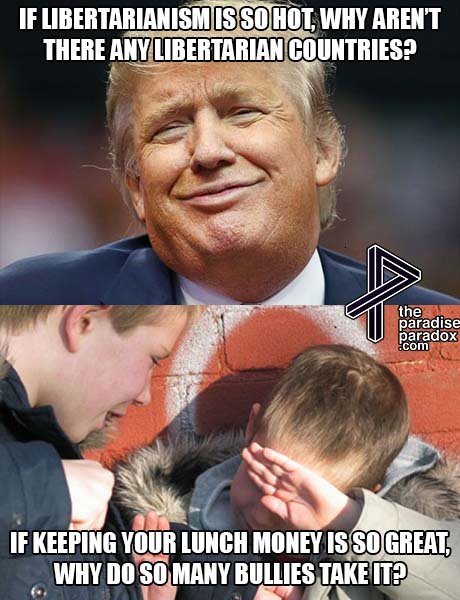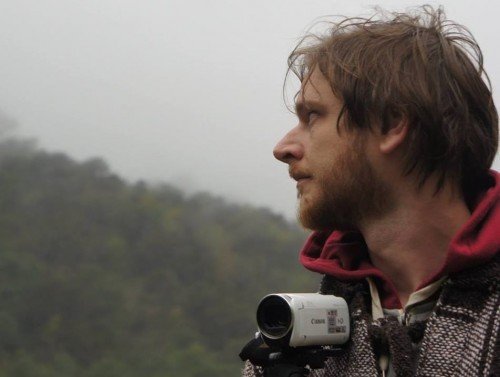
Of course, there are some countries and regions that have many libertarian aspects, such as Switzerland, Liechtenstein and Liberland, and they tend to be rather prosperous.
However, obviously the reason more governments don't choose libertarian policies is because generally people who have power generally like to keep power, and even expand it. Some studies suggest that power has an addictive effect on the brain, similar to a drug. A wise man once said: "It is difficult to get a man to understand something, when his salary depends upon his not understanding it!" and so, even assuming good intentions, what politician or king would really be willing to consider the idea that his job that his job was futile, or even harmful? Persons of such integrity are rare, and I imagine, rarer still in politics.
The question "Why aren't there any libertarian countries?" takes for granted the idea that governments are here to help us, an idea which generally can only survive in certain countries, where corruption is well-hidden. In countries where children have grown up seeing their parents paying bribes, people don't have the privilege of seeing the world in such a rosy way. A phrase like "taxation is theft" is seen as an exaggeration in English-speaking countries, but in many countries, it goes unsaid, because people accept it as an obvious fact - and a sad reality.
The reason there aren't more libertarian countries is because it's hard to loosen a grip on the staves of power which have held on for so long, and it's hard to get people to see that there might be another way. Little by little, the fingers are pried from the club.

About me

My name is Kurt Robinson. I grew up in Australia, but now I live in Guadalajara, Jalisco. I write interesting things about voluntaryism, futurism, science fiction, travelling Latin America, and psychedelics. Remember to press follow so you can stay up to date with all the cool shit I post, and follow our podcast where we talk about crazy ideas for open-minded people, here: @paradise-paradox, like The Paradise Paradox on Facebook here, and subscribe to The Paradise Paradox on YouTube, and on iTunes
Why would you consider Hong Kong and Singapore libertarian? Singapore is practically a totalitarian state, and Hong Kong is run by business groups and the triads.
Downvoting a post can decrease pending rewards and make it less visible. Common reasons:
Submit
Now that I've had people mention it a few times, I think I might edit that part out. They are rating top two for economic freedom in the world, but obviously they're very authoritarian states.
Downvoting a post can decrease pending rewards and make it less visible. Common reasons:
Submit
Because the banksters own the minds of the sleeple.
Keep working, stop paying.
Downvoting a post can decrease pending rewards and make it less visible. Common reasons:
Submit
Liberland : a good example ?
"Free Republic of Liberland, is a self-proclaimed micronation claiming a parcel of disputed land on the western bank of the Danube river"
https://en.wikipedia.org/wiki/Liberland
Population : 40 hab. (2015)
Densité : 5,7 hab./km2
Superficie 7 km2
Downvoting a post can decrease pending rewards and make it less visible. Common reasons:
Submit
It's not a great example, but it's something.
Downvoting a post can decrease pending rewards and make it less visible. Common reasons:
Submit
Why do some people want to impose their point of view on the whole planet? Why do some people think that they have the truth and that everyone is wrong? Historically, the people look for leaders, managers, mentors and even libertarians have their mentor!
Downvoting a post can decrease pending rewards and make it less visible. Common reasons:
Submit
I'm not really sure what you're getting at.
Downvoting a post can decrease pending rewards and make it less visible. Common reasons:
Submit
Because humans are stupid and irresponsible.
Libertarianism requires as disciplined and responsible population, whereas what we see now (even in the personal lives of people) is the exact opposite.
Libertarianism is a utopia, that humans simply don't deserve.
Downvoting a post can decrease pending rewards and make it less visible. Common reasons:
Submit
If that's the case, obviously humans can't be trusted with a democracy either.
Downvoting a post can decrease pending rewards and make it less visible. Common reasons:
Submit
Of course not, democracy is the worst form of government that has ever existed.
Downvoting a post can decrease pending rewards and make it less visible. Common reasons:
Submit
Your preference is monarchism or a dictatorship?
Downvoting a post can decrease pending rewards and make it less visible. Common reasons:
Submit
Neither, I want a free voluntary society with no government, where everyone governs himself, but I was saying earlier that it's pretty much unlikely that this will ever happen, and definitely not in our lifetimes.
But that doesn't mean that I would not prefer such thing.
Downvoting a post can decrease pending rewards and make it less visible. Common reasons:
Submit
Okay, I'm with you now.
I live in a place where hardly anyone depends on the government. If there's a crime, many people won't bother calling the police because they know it's futile. From what I've seen, I don't think it takes any supreme enlightened beings to live in a society like this; it just takes everyone doing their thing.
I think if a government breaks down in a society where people are independent enough to ignore it, that might be the first voluntary society.
Downvoting a post can decrease pending rewards and make it less visible. Common reasons:
Submit
Good for you, now the only thing that needs to be done is eliminating taxes, since if the govt doesnt provide any service what is the point of taxes? :)
If they can resist the nationalist influences of securing the nation = creating a government.
If they can resist the marxist influences of establishing our equal community = creating a government.
Government will sneak in left & right, so people have to be very educated to resist it. The first requirement is freedom of speech, which is just a thing since the internet. We are a long way of securing our freedom.
Downvoting a post can decrease pending rewards and make it less visible. Common reasons:
Submit
Anarchism is utopia. Libertarianism is possible, although people are stuck on a mindset that tells people should hand all their important decisions to authorities always. This is bound to change, imho, but maybe slowly.
Downvoting a post can decrease pending rewards and make it less visible. Common reasons:
Submit
Both are possible, but it takes a lot of evolution in human society. Maybe in a 1000 years we will look back and see how primitive we were, but not in the near future.
Downvoting a post can decrease pending rewards and make it less visible. Common reasons:
Submit